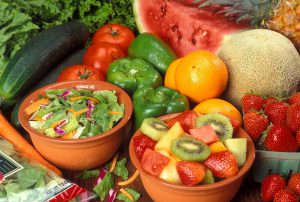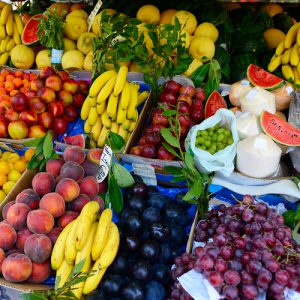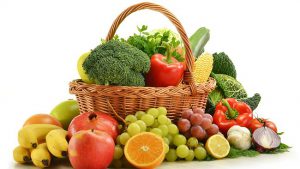Fruits, Vegetables and Cancer
Nerd Alert! I’m always wanting to understand why. For a long time we have been encouraging our clients to eat lots of fresh fruits and vegetables to lose weight and be healthier. We have watched many clients shed pounds and improve their health by including more produce in their diets. We have also had many of our clients tell us firsthand that they just feel better because of the changes they’ve made in their eating habits. And more importantly, the health community is telling us repeatedly that eating lots of fruits and vegetables can help prevent chronic diseases like cardiovascular disease and cancer. I believe this to be true; I just wanted to know why, and I thought you might want to know as well.
So please bear with me in this technical article as I share what I’ve learned about the ability of fruits and vegetables to help prevent chronic diseases.
 There is lot of speculation about what causes chronic diseases like cardiovascular disease and cancer. One of the most common possibilities for a cause of both of these diseases is oxidative stress. To understand oxidative stress, we need to know a little about free radicals. A free radical is an oxygen-containing molecule that has lost an electron. Electrons always run in pairs, so that means one of the electrons in a free radical needs to find a partner. The one lone electron will act like a high school senior who doesn’t have a date for the prom—it will do whatever it takes to find a mate, which usually means stealing an electron from a healthy cell like a fatty acid, DNA, protein or cholesterol. This starts a destructive chain reaction of electron stealing. The result can be cell membrane damage, cellular protein damage, DNA damage, oxidation of LDL cholesterol and inflammation. Most of the time antioxidants like vitamins C and E, beta-carotene and phytochemicals neutralize free radicals by donating one of their own electrons, ending the electron-stealing reaction.
There is lot of speculation about what causes chronic diseases like cardiovascular disease and cancer. One of the most common possibilities for a cause of both of these diseases is oxidative stress. To understand oxidative stress, we need to know a little about free radicals. A free radical is an oxygen-containing molecule that has lost an electron. Electrons always run in pairs, so that means one of the electrons in a free radical needs to find a partner. The one lone electron will act like a high school senior who doesn’t have a date for the prom—it will do whatever it takes to find a mate, which usually means stealing an electron from a healthy cell like a fatty acid, DNA, protein or cholesterol. This starts a destructive chain reaction of electron stealing. The result can be cell membrane damage, cellular protein damage, DNA damage, oxidation of LDL cholesterol and inflammation. Most of the time antioxidants like vitamins C and E, beta-carotene and phytochemicals neutralize free radicals by donating one of their own electrons, ending the electron-stealing reaction.
Oxidative stress occurs when the production of free radicals outpaces the body’s ability to neutralize them and counteract their harmful effects through antioxidants. Remember, some free radicals are produced as part of the body’s normal metabolic processes. Also, it’s important to understand that sometimes the immune system will produce free radicals as a way to attack and kill pathogens. But if free radical production becomes excessive over an extended period of time, and antioxidants are in short supply, damage to healthy cells and tissues can occur. Excessive oxidative stress can possibly lead to many pathophysiological conditions in the body. Some of these include neurodegenerative diseases such as Parkinson’s disease and Alzheimer’s disease, gene mutations and cancers, chronic fatigue syndrome, heart and blood vessel disorders, heart failure, heart attack and inflammatory diseases.
 Environmental factors such as pollution, radiation, cigarette smoke, and herbicides can increase free radical production. Also the normal process of aerobic metabolism in the body produces free radicals. Endurance exercises like running or biking that place a much greater demand on aerobic metabolism over extended periods of time greatly increase free radical production. Have you ever noticed that people who run a lot and people who smoke a lot both tend to look a lot older than they are? As we get older free radical reactions are expected to produce progressive adverse changes that accumulate with age throughout the body. These “normal” changes with age are relatively common. However, when we repeatedly expose ourselves to factors that increase free radical production, such as cigarette smoke or chronic exercise, or we continually deprive ourselves of antioxidants, such as vitamins C and E, beta-carotene and phytochemicals, we greatly increase our oxidative stress.
Environmental factors such as pollution, radiation, cigarette smoke, and herbicides can increase free radical production. Also the normal process of aerobic metabolism in the body produces free radicals. Endurance exercises like running or biking that place a much greater demand on aerobic metabolism over extended periods of time greatly increase free radical production. Have you ever noticed that people who run a lot and people who smoke a lot both tend to look a lot older than they are? As we get older free radical reactions are expected to produce progressive adverse changes that accumulate with age throughout the body. These “normal” changes with age are relatively common. However, when we repeatedly expose ourselves to factors that increase free radical production, such as cigarette smoke or chronic exercise, or we continually deprive ourselves of antioxidants, such as vitamins C and E, beta-carotene and phytochemicals, we greatly increase our oxidative stress.
This increased stress can damage and age all the cells in your body, and greatly increase your risk for cancer tumor formation and the build up of plaque in arteries, leading to cardiovascular disease. We can reduce oxidative stress by either reducing our production of free radicals or consuming a diet rich in fruits and vegetables.
 So why not just take antioxidants like vitamins C and E, beta-carotene and phytochemicals in the form of a pill or powder? Because whole foods and whole diets composed of them, not single nutrients, have been proven to be most influential in cancer prevention. Also, when you divorce vitamins from the food matrix God put them in, your body handles them differently. In fact, some studies have shown that taking vitamins such as beta-carotene can increase the risk of cancer.
So why not just take antioxidants like vitamins C and E, beta-carotene and phytochemicals in the form of a pill or powder? Because whole foods and whole diets composed of them, not single nutrients, have been proven to be most influential in cancer prevention. Also, when you divorce vitamins from the food matrix God put them in, your body handles them differently. In fact, some studies have shown that taking vitamins such as beta-carotene can increase the risk of cancer.
Eating lots fruits and veggies now makes even more sense when you understand the science behind these natural healers. I hope it has also resonated with you. I know I will continue to eat a serving of fruit at least 3 times a day, and eat 4 or more servings of vegetables a day. And, I hope you will, too!
Stay Strong,
Bo Railey

